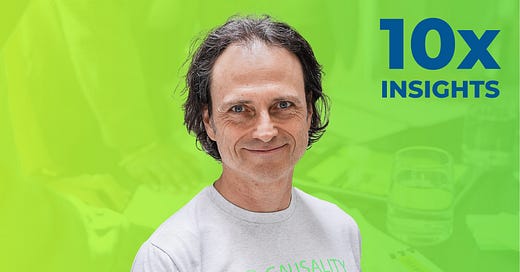10x By Leadership
Listen to the Audio Version here
A child is drowning on a crowded beach, witnessed by dozens of guests.
Why?
Kitty Genovese was murdered in 1964 outside her apartment in New York City while 38 witnesses reportedly did nothing to help. This case spurred early research into the so-called “bystander effect”.
Social psychologists John M. Darley and Bibb Latané conducted a series of experiments to investigate the bystander effect. Their studies found that individuals are less likely to help in a situation when others are present, due to diffusion of responsibility (assuming someone else will act) and social influence (looking to others to see how to react).
Fast forward 2024, …
I am presenting how Causal AI can transform marketing into a large enterprise. The professional is convinced …. “But” … he says and continues “If this is so fantastic, why is nobody using it in our company already? We have dozens and hundreds of smart people. Every week we hear great pitches of new AI startups. Why is nobody seeing the obvious?”
I can’t blame him. He is just hesitating as most people would. We always orientate ourselves to other people. We are social beings.
“Enterprises suffer from bystander effect”
But still, we have a choice. According to Viktor Frankl, there is room between stimulus and reaction, which is the freedom of your choice. This is what differentiates humans from other creatures.
Research shows that people know by intuition what the right thing to do is.
But they trust the crowd more than their own judgment.
Resisting the social instinct and taking action because it is the right thing to do, is what I call “leadership”.
“Leaders take actions when others do not dare”
Leadership means having trust in your judgment. It means to have the guts and courage, to do what’s right for you in the moment, rather than to play it safe – for selfish reasons.
The bystander effect teaches us, that we miss huge potential for improvement and innovation in enterprises. The effect is even larger when
- the organization is large (this are all enterprises)
- the situation is complex or ambiguous (this is marketing)
- the more complex the organizational structure is (matrix organizations, silos, multiple stakeholders)
As an enterprise leader, what can you do?
Recognize the warning lights
When decisions were made too easily, J.F. Kennedy had a habit of stopping the decision process and included outsiders in the decision process. The easier the decision process the more likely group thinking is biasing the outcome. If you are celebrating your methods too hard internally, it’s time to inject fresh blood.
Hire the right people
Hire people with entrepreneurial attitudes, people who trust their own intuition, who take responsibility, who strive to create impact.
Be transparent
Create the right culture by educating about the bystander effect. Collect internal examples that exemplify the results. Encourage people to take risks. Celebrate them.
Self-defense seminars teach students to shout for help when the bystanders ought to help. Culture seminars should teach similar things. You can’t miss out on doing the right thing, just because nobody is doing it.
How could a comparably small startup like OpenAI could overtake the AI giant Google? Why does the world’s largest automaker Volkswagen need to collaborate with Rivian on E-mobility technology – a company with one fifties of size? How could a newly established company (TESLA) become a category leader in electric cars against vast giants like Volkswagen, Toyota, Ford, etc.? Why did Kodak miss the digital photography market? The list goes on and on.
“Startups easily beat enterprises”
Some say this obvious evidence tells us that enterprises are incapable of truly innovating not only on their products but their processes. The organizational and situational complexity make the bystander effect too prominent. In “Startup Century” James Wise argues that in the future we all must and will become an entrepreneur.
But I don’t give up on enterprises. We are not the victims of circumstances. We are creators too. I met a lot of those entrepreneurial creators in enterprises in the past decade. People who not only optimize for their own career and minimize their workload but simply search for the right thing to do.
I believe with the right twists in the organization, enterprises DO have the ability to excel.
According to Steve Jobs: "Decisions should be made by the person with the best understanding of the problem."
“Decisions should be made by the person with the best understanding of the problem”
If you create a system where a single most knowledgeable person is designed to make a decision, he is more likely to follow his own wisdom…
... and rescue the drowning child.
The examples of Testla, OpenAI, & Co. teach us that we have HUGE potential in enterprises. It is fair to say:
if you are able to reduce the bystander effect,
if you then enable so far unimaginable insights,
if you this way experience faster, cheaper, but foremost better –
then you unleash impact…
THIS.. is how you 10x your impact with insights.





